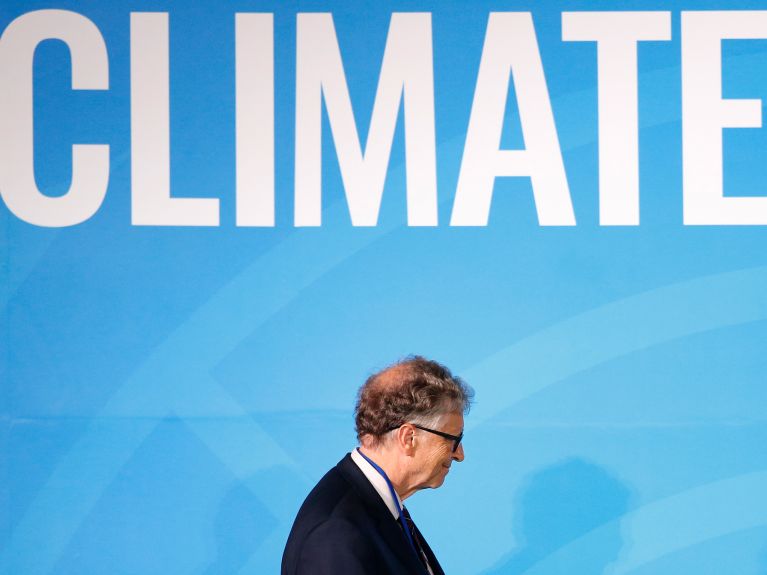Power rankings
Bill Gates is wrong. Nuclear power will not save the climate. Beyond Chernobyl and Fukushima, there’s too much speaking against it.

Nuclear power? No, thank you! “That chapter is over,” a spokesperson recently proclaimed. Nuclear power isn’t even a topic anymore, she argued. And this spokesperson wasn’t from some environmental organization or the like; she was representing RWE, one of three large corporations in Germany that still produces electricity from nuclear energy.
Priority is the switch to renewable energies
The two other companies, EnBW and Eon, have issued similar sentiments, pointing to the fact that their priority is now the decommissioning of nuclear power plants and the switch to renewable energies.
Just prior to those comments, members of Germany’s industrial community had joined up with the WerteUnion – a group of conservative parliamentarians from the CDU – to suggest longer running times for the remaining German nuclear power plants.
Phase out nuclear energy production
But this suggestion was greeted with a unanimous negative response from electricity corporations: the use of nuclear energy in Germany was over, they argued. Period. In 2011, after the nuclear catastrophe at Japan’s Fukushima Daiichi power plant, Germany decided to phase out nuclear energy production for good by 2022. With its clear pledge to abandon nuclear technology, the country has remained an exception on the international stage.
Transformation in our thinking
Today, nuclear energy is experiencing renewed momentum worldwide as a result of the climate change debate. In January, for example, in the journal Science, energy experts called for a “transformation in our thinking,” arguing that it would be a serious mistake to shut down nuclear power plants, because it would lead to an even greater increase in climate-damaging greenhouse gas emissions. “We should preserve existing nuclear power plants and reimagine how new plants can be delivered.”
Gates advocated nuclear renaissance
One of the most prominent advocates of a nuclear renaissance is Bill Gates. Late last year, in an open letter to employees, the Microsoft founder wrote: “Nuclear is ideal for dealing with climate change, because it is the only carbon-free, scalable energy source that’s available 24 hours a day.” The problems associated with today's reactors, he argued, “can be solved through innovation.”
A contradiction to environmental protection
For decades, the idea of being in favor of nuclear energy for environmental reasons would have seemed a contradiction in terms to many people. In Germany, the environmental movement and the political party known as The Greens have their very roots in the resistance to nuclear power. Today, however, the climate crisis is causing this united front to crumble. Groups like Environmental Progress and the Ökomodernisten (Ecomodernists) no longer see nuclear energy as an ecological evil, but as a climate-neutral solution to energy problems. These groups advertise nuclear energy vociferously on the internet and at public “Nuclear Pride” festivals.
Bill Gates has moved beyond the advertising phase. The Microsoft founder now owns a company called TerraPower, which performs research into novel nuclear reactors including the “wave reactor.” Gates wants to invest $1 billion of his own funds in this particular technology, while raising the same amount from private investors. He also wants to get state funding for the technology, if possible. According to the Washington Post, Gates even met with US Congressmen to convince them of the benefits of nuclear energy.
Overaged nuclear power plants
In the United States, the question of what to do with nuclear energy is particularly acute. Nuclear fission currently accounts for roughly 11 percent of global electricity, and for around 20 percent in the United States. As the Union of Concerned Scientists (UCS) points out in a recent study, one in every three of the approximately 60 nuclear power plants in the US might have to be shut down in the next few years because they are either too old or are already losing money today.
Fallen prices of natural gas
According to the scientists, this would become a problem if the decommissioned capacities were replaced by fossil fuels such as coal and gas, which would increase greenhouse gas emissions. This scenario, however, is not guaranteed. Indeed, although the price of natural gas has fallen in recent years, due to booming shale gas mining, for example, the costs of photovoltaic and wind energy are also falling.
$4 billion to make an nuclear power plant profitable again
This decline in the price of renewables is seen as one of the major reasons why nuclear energy is less and less viable. Some states in the US, including Illinois, New Jersey and New York, have nonetheless subsidized unprofitable nuclear power plants in order to secure their operations.
This is by all means a daring investment. The UCS estimates that it takes an average of $4 billion to make an unprofitable power plant profitable again. Equipping nuclear reactors to continue running only 20 years longer than planned usually requires expensive modernization measures designed to keep the aging technology in good condition, says Frank Peter, co-head of the think tank Agora Energiewende. “These investments often make no economic sense.”
Read the whole text on The German Times website.
Christoph von Eichhorn is a science editor at the Süddeutsche Zeitung.


